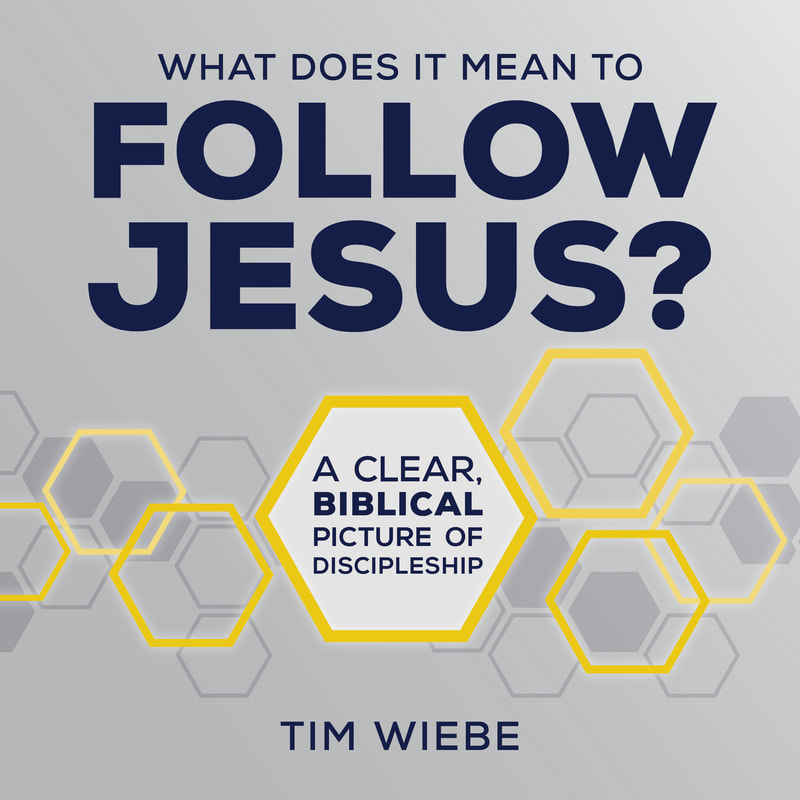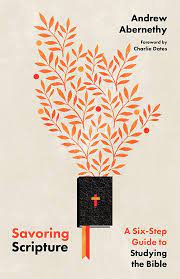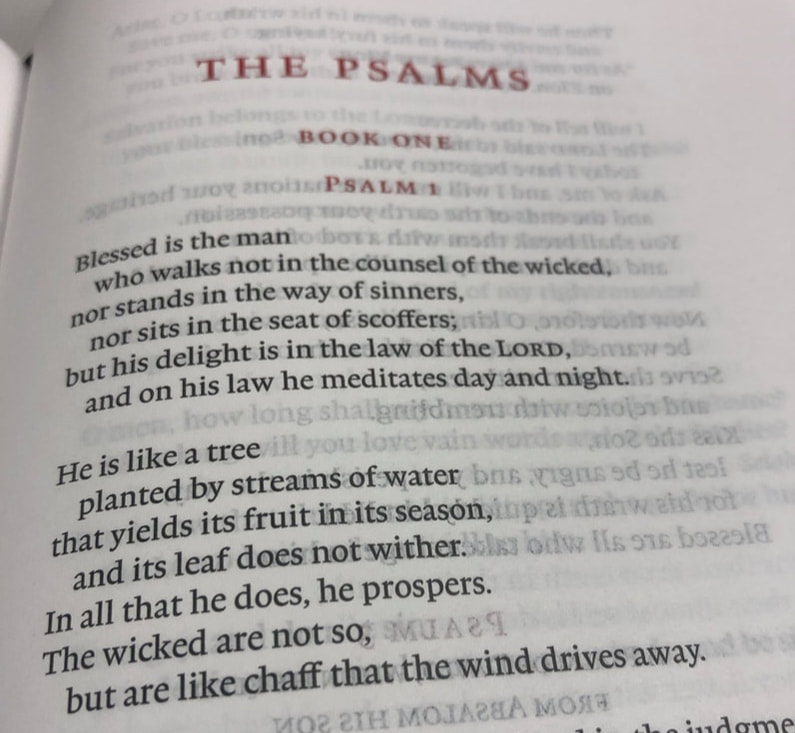|
In January 2024, I published What Does It Mean to Follow Jesus? A Clear, Biblical Picture of Discipleship. A few people have asked for a bit more info on the book, so I'm creating this post as a sort of "landing page" for book info, any video(s) I create related to it, etc. Scroll through the headings below and check it out. (And help spread the word!)
3 Comments
One of our core values at Brookside Church is Biblical Authority — looking to the Bible for truth, direction, and inspiration. On Sunday mornings we preach from the Bible. Our small groups (all ages) are tethered to God's Word. We have been encouraging personal Bible reading for YEARS through our 365 Bible Reading Plan. The bottom line? We believe the Bible is uniquely authoritative as God's Word, and useful for teaching, rebuking, correcting, and training for right living (see 2 Timothy 3:16-17). But we don't only care THAT people read God's Word. (Though of course we never want to minimize this either!) We also care HOW people read God's Word. Or stated another way, we want to help people get into the Bible in such a way that they get the most out of the Bible (in a way that is consistent with how the Bible itself wants to be read!). Our goal is that our teaching models this and certain classes we offer facilitate this (think: Bible Basics). And we also want to point people toward helpful resources that contribute to this goal as well. With that in mind, here are six resources I encourage others toward, when I hear they want help with understanding how to read the Bible on their own, or with interpreting certain kinds of Scripture, etc. I hope these help you get into God's Word, in such a way that God's Word gets into you! (Note: These are listed in no particular order. [Other than the Study Bibles at the beginning — start there if you don't have a study Bible yet.] Choose the one or two of these that you find more interesting, and dig in!)
You may also be interested in...
I'm a big fan of discipleship pathways. It's good for churches to have intentional ways forward (e.g. programs, resources, etc.), helping people grow as disciples (and disciple-makers). I'm encouraged that I anecdotally hear more and more churches uses the language of "discipleship pathway."
But I also want to paint the picture of a discipleship pathway as a four-lane road, rather than a one-lane bridge. Allow me to explain what I mean: A one-lane bridge is narrow and rigid. There's only one way forward, and it usually slows down traffic. There's only one way to get to your destination, whether you like bridges or not. When some people see a one-lane bridge, they do a U-turn and head the other direction. For "one-lane bridge" discipleship pathways, every next step along the path of discipleship (and every tool that's part of that next step) is planned out and mandated. I'm concerned that it can feel too rigid, and may even impede progress. But gladly, there's another way. In Matthew 25:14-30, Jesus shares a parable often called "The Parable of the Talents" or "The Parable of the Bags of Gold." In this parable, the master of an estate entrusts three of his servants with bags of gold while he goes away on a journey. It is clear from this parable that this money is the master's, and as his servants these three men are to steward the money in a way that honors the master.
After a long time (v. 19) the master returns, and his servants report back to him. The first two servants are commended: "Well done, good and faithful servant." They're invited to share the master's happiness and will continue to contribute meaningfully (vv. 21, 23). The third servant, however, is both wicked and lazy (v. 26). He hasn't added to his master's wealth at all. It's likely that the "spending power" of the bag of gold with which he is entrusted is actually less, given that the master was gone "a long time" (v. 19) and the realities of inflating costs. The third servant did nothing with this money that would even add interest to it. This third servant, then, is then excluded from the master's joyful presence and assigned to a place of "darkness, where there will be weeping and gnashing of teeth" (v. 30). There's obviously a lot that can be said about this parable. I want to focus our attention here on the clear point of the parable: we're to be faithful servants with what we've been given. (If you want to hear a full 40 minute sermon I've given on this passage, click here.) And that means the next right question is this: What drivers motivate my faithfulness? How can I anticipate with confidence hearing these words from Jesus someday, "Well done, good and faithful servant"? Here are four drivers — straight from this parable — that can help us anticipate hearing these words from Jesus ourselves. This last weekend I preached on "Gospel Ordinances"—baptism and the Lord's Supper—and talked about how these two practices help the church stay tethered to the gospel. I’ve sat in a bunch of classrooms and academic environments hearing about the ordinances (baptism and Communion/the Lord’s Supper), but haven’t heard many sermons on them. But these practices ARE FOR THE CHURCH! It's important to preach on these things in the setting of gathered worship where they are regularly practiced. If you’re not a Christian or are brand new to church, this’ll be super helpful at helping you understand these practices that may seem weird / foreign to you. If you’re someone who grew up in a different tradition than Brookside, watch the message—we'll open up the Bible and you’ll see where we’re coming from. If you’ve been following Jesus for a long time, we need to watch that these things don’t become mechanical. Tomorrow we’ll breathe fresh life into the meaning behind them. If you're interested, here's a brief outline of what I covered:
In John 15, Jesus draws on vivid imagery to describe the life He offers, and the life His followers find in Him. John 15:5 perhaps sums it up most clearly: "I am the vine; you are the branches. I you remain in me and I in you, you will bear much fruit. Apart from me you can do nothing."
The take-away is clear. As His followers, we need to stay connected to Jesus. He's our life, and only through Him we bear fruit. As I've been meditating on this verse, however, I wonder if too often I can approach Jesus more as a gas pump than a vine. But what does that mean? And why is it dangerous? Joshua 1:8 is a clinic on how to approach God's Word well. Keep this Book of the Law always on your lips; meditate on it day and night, so that you may be careful to do everything written in it. Then you will be prosperous and successful. The take-aways are clear. God's Word should be on our lips.We speak it. This doesn’t mean that we follow every sentence with a verse reference; it means we are so full of the truth in this Book that it naturally influences and spills out in what we say! God's Word should be in our hearts.We meditate on it. We reflect on it and sit in the truths we encounter in the Bible. The story of the Bible forms us. The best picture I have for biblical meditation is marinading meat - think "chicken" or "steak". When meat soaks in a marinade and that’s done well, that marinade will permeate the meat so that when you take a bite, you can’t taste the meat without getting a hint of the marinade. That’s what mediating on the Bible means: God’s Word has so permeated our hearts - we’ve soaked in it so deeply - that every part of us has the taste of God and His Word. God's Word transforms our actions.We apply it. As much of a fan as I am for knowing the Bible, we never want to JUST know the Bible. This Book isn’t just about information; it's about transformation. When you put all this together, here’s what this means: We need to fight for the priority of God’s Word in our daily lives. There’s so much pressure to keep up with the latest news cycle and there are so many distractions with media and entertainment and busyness. My concern is we’re getting so consumed by these things that we’re neglecting the priority of God’s Word and the story it invites us into. Keep spending time in this book! Slowly, repeatedly, day by day over the course of weeks and months and years. This is God’s Word to us - that’s how valuable it is, and how much we need it! You may also be interested in...What does it look like to grow in knowing, loving, and obeying the message of the Bible? Here are three tips I try and live by myself, and three tips I’d recommend to anyone wanting to engage the Bible well. (For those of you that can appreciate some alliteration, watch out for the R’s. 😀)
Brookside Church is getting ready to launch a 4-week series on the Psalms. (Can't wait!) We'll be preaching through individual psalms each week. (We did this in the summer of 2018 as well. Click here to see what we preached on then - Psalm 23; Psalm 16; Psalm 121; Psalm 84.)
In case you want to dig a little deeper or just familiarize yourself with the Psalms, below I've listed three resources that you can dig into on your own, with your friends, or as a family. If you ever check out either the Library or the footer of this site, where we highlight the top 5 posts of the previous month, you'll have seen that "Character Counts | The Fruit of the Spirit (Galatians 5:22-23)" has been on this "Top 5" streak for a while (a long while!). And it's understandable why. Character matters. When it's lacking, its absence reminds us that it matters. When character shines, its presence shows us that it makes a difference. If you've not checked out the post, you can do so here. So as a nod to the popularity of this post, I'm officially going to "retire the jersey." I'll leave the post just as it is on the site and will include it in the "retired jersey" category of this site's "Library" page. However, moving forward I'll no longer include it in numbers 1-5 of each month's top posts (even though it continues to rank highly among the website "hits" for individual posts), thus allowing room for other posts. Interested in other posts that have gotten a lot of traffic on this site recently? Click here to check 'em out! Interested in seeing all of the "retired jersey" posts up to this point? Here they are:
|
Tim WiebeChristian. Husband. Father. Pastor. Learner. Contributor. Reader. Categories
All
Archives
June 2024
|
© 2014-2024 | 11607 M Circle, Omaha NE, 68137 | www.thebrooksideinstitute.net
















 RSS Feed
RSS Feed
